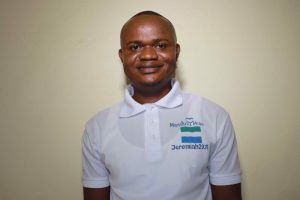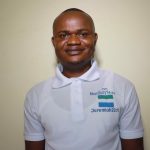The only water source for the 168 people in Korankoya is an open scoop hole in the local swamp.
People try to get to the swamp as early as they can so that the water won't be stirred up from all the other people and animals scooping out water all day. But even if someone is the first person to fetch water, tadpoles, water plants, decaying leaves, and other debris may still end up in people's buckets.

So, all water coming from this source must go through a rigorous treatment procedure before it can be used for most purposes. First, the water must sit for several hours so all the particulates will settle to the bottom of the container. Then, the water is sieved to remove as much of this as possible. Finally, it is boiled if there is firewood and time to spare.

Unfortunately, even after all this care, the water would still be contaminated. The scoop hole sits in the middle of a field of farms and gardens where fertilizers and pesticides are used. People also bathe and launder their clothes near the swamp to avoid carrying so much water back and forth, which allows soap and other contaminants to seep into the surrounding soil. No amount of boiling or hand-sieving can remove these things from water. This is why Korankoya's people suffer from chronic diarrhea and skin rashes.
"I have lived here for quite a long time," said 30-year-old farmer and trader Mbalu Bangura (pictured below carrying water home from the swamp). "Living in this community is difficult because of the challenges I always have fetching water. The only water source is the swamp, [which] is far from my house. I can only get clean drinking water from the swamp when I wake up early in the morning. Besides that, other people would have gone to fetch water, and the water would be filthy to drink."

"I boil the water and filter it before drinking," Mbalu continued. "This is also time-spending, and when I have other activities to complete, it would be difficult for me to meet deadlines.
"I usually become worried when my children are out fetching water from the swamp. The water area is prone to snakes, and the children are at risk anytime they go to fetch water. It is not easy for me to go to my farm early and come back early to prepare food for my family. I will be extremely glad if we can get a water well in this village. This will help to prevent us from the risks we are taking to fetch water from the swamp."
"I am not happy about the water condition in this village. It is affecting me every day," said 16-year-old Hawanatu S (pictured below at the swamp). On top of walking to the next village to go to school every day, she makes many trips to the swamp on behalf of her family, leaving her too drained for studying — or playing.

"I wake up early every morning to rush to the swamp to fetch water and prepare for school. It is difficult for me to fetch water and prepare for school without getting late. After school, I would fetch water to the house and wait for my mother to come before we could start preparing food. We finish preparing food late in the evening. Life is not easy without water to drink and use for other purposes."
Safe, reliable water access will reinvigorate the people of Korankoya who have had to drink swamp water their entire lives. With water closer at hand, they will be able to accomplish more tasks throughout the day and reserve some time for fun or rest at night.
What We Can Do:
New Well
Where we will be drilling is centrally located and will relieve many people of the long journey to fetch water and the challenge of accessing clean water.
Our team will drive over the LS200 mud rotary drill rig and set up camp for a couple of nights. Once the well is drilled to a sufficient water column, it will be cased, developed, and then tested. If these tests are positive, our mechanics will install a new India Mark II pump.
By drilling this borehole, the surrounding community will be provided with plenty of accessible, clean drinking water.
Training
There will be hygiene and sanitation training sessions offered for three days in a row.
Community members will learn how to make a hands-free handwashing station called the "tippy-tap." We will use these tippy taps for handwashing demonstrations and will also teach about other tools like dish racks and the importance of properly penning in animals. We will highlight the need to keep restrooms clean, among many other topics.
This training will also strengthen a water user committee that will manage and maintain this new well. They will enforce proper behavior and report to us whenever they need our help in solving a serious problem, like a pump breakdown.





 Borehole Well and Hand Pump
Borehole Well and Hand Pump
 Rehabilitation Project
Rehabilitation Project



























